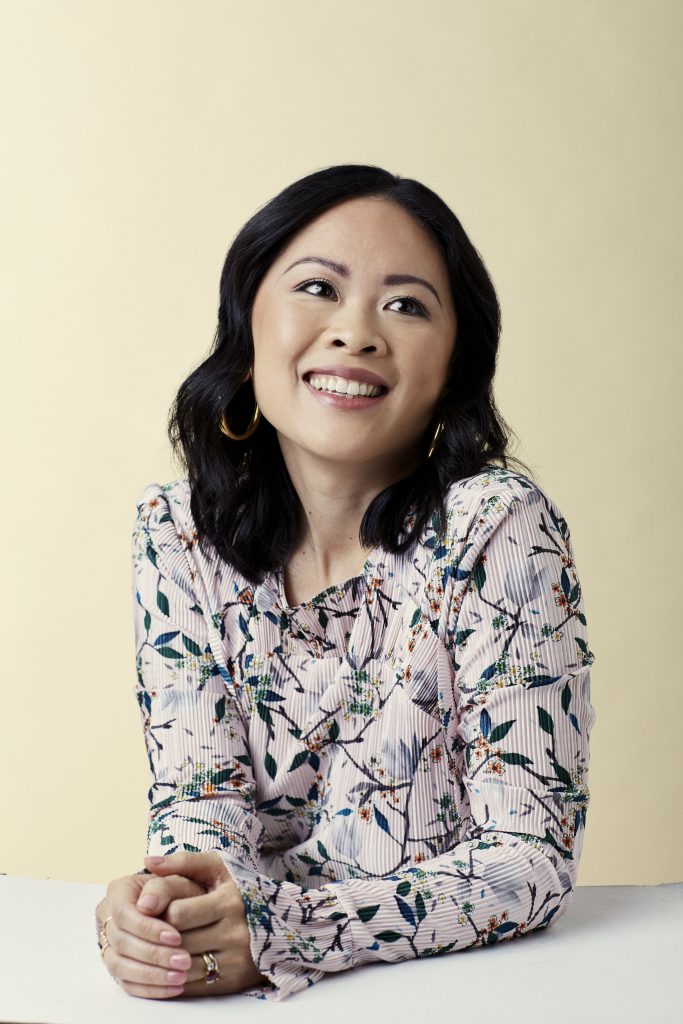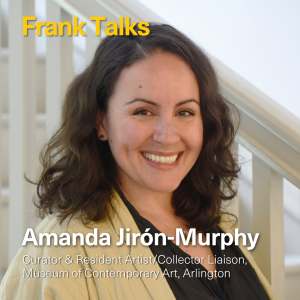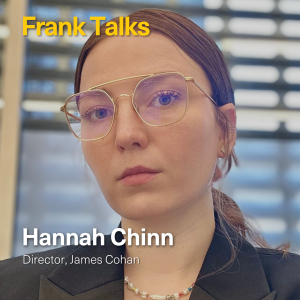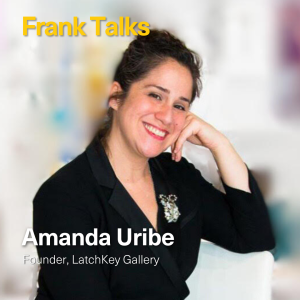Yng-Ru Chen (she/her) is the Founder and CEO of Praise Shadows Art Gallery, a contemporary art program based in the Boston area with a focus on exceptional artists working in all artistic disciplines. She also oversees Praise Shadows Art Partners, which works closely with artists to develop opportunities in emerging models of creativity and entrepreneurship — exhibitions, commissions, brand partnerships, new technologies, original concepts that no one has ever tried before. She previously worked at MoMA P.S.1, Sotheby’s, Asia Society, and Tattly. www.praiseshadows.com
AF: Hi Yng-Ru! We are so happy to chat with you. To start us off, we want to know more about your upbringing. Where did you grow up and what are the arts communities like there?
YC: Thanks for inviting me to chat. I was born in Taipei and raised in the Boston area from the age of five until I went to college. I went to the Brookline public schools, which had amazing art programming, such as music education and interesting art electives at Brookline High where I took photography, ceramics, and jewelry-making. When I was in fifth grade, I was invited to a summer camp at Tanglewood for Boston public school kids. It was life changing to take music lessons in the morning, and then sit in on dress rehearsals with Yo-Yo Ma in the afternoon. My parents were immigrants and worked in non-arts related fields, so I really am thankful to my public school education and the opportunities it provided. This is why I moved back to the same community three years ago, from New York City, to raise my kids.
AF: Did you always know you wanted to work in the arts?
YC: Not at all. While I would periodically visit museums with my parents as a child, I was not an artist so didn’t aspire to work in that field. I also didn’t even know it was an occupation! I went to Williams College, where taking Art History 101 was something everyone did. I didn’t even take it until my sophomore year, but once I did, I was hooked. I started interning in the arts while in college and from then on I aspired to work in the arts after graduation.
AF: What was your first ever job? What is an important lesson from it that has carried with you?
YC: My first full-time job was at the Asia Society. I was hired on the same week as 9/11, so it was a pretty intense time. I was the Press and Marketing Assistant, which meant stuffing press releases in envelopes, sending transparencies and slides to photo editors via courier, and picking up the phone when producers and editors called. At the time, places like CNN called a lot. This was because the President of the Asia Society at the time was Nick Platt, the former ambassador to Pakistan and the Philippines. The United States was under-educated when it came to understanding the Taliban, Pakistan, Afghanistan, and so much of the history and politics related to the region. I took the job to work at a cultural institution, but it was edifying for me as a young person to witness firsthand the intersections of art, history, politics, and social issues. 2001, when I was hired, was also when the museum brought in Melissa Chiu (now director of the Hirshhorn) as curator of Asian and Asian American contemporary art. It was the first time I worked with living artists, and that also opened my eyes to many things that I would ultimately end up doing in my career.
AF: You are the founder of Praise Shadows Gallery, located in Boston, MA! We would love to know more about Praise Shadows, how it came to be, and your aspirations for the gallery.
YC: I never, ever, intended to open a gallery. I never, ever, intended to move back to Boston. Life is funny that way. When I moved back to Boston in late 2019, my work was primarily all in New York, where I built my professional career. Of course, the pandemic upended so many things. In 2020, I became more aware of the people who make up the art ecosystem in Boston. The curators here are brilliant, generous, people. There are great collectors and advisors. The museums are world class. One day in June 2020, I was walking with my daughter in my neighborhood, where I grew up and where we now live, and I realized that this newly vacant retail space had potential as a gallery. Fast forward to a meeting with my lovely landlord, who gave me a lease that made it possible for me to take the risk. Suddenly, I had one year’s worth of exhibitions lined up, with solos by Jarrett Key, Duke Riley, Yuri Shimojo, James Clar, Madeline Donahue, and more. Our first 12 months were incredible, considering we were still masked all day at work, and we didn’t have any in-person openings. The MFA Boston began an acquisition of a sculpture by Madeline Donahue during our second show, and that felt so true to what we are as a gallery because I am a museum person at heart, and it’s important to me that our program presents artists who have a place in these incredible institutions. I aspire for Praise Shadows to continue showing great artists, a lot of whom are mid-career and are doing the best work of their careers.
AF: Tell us more about the meaning behind the name, “Praise Shadows.”
YC: The name of the gallery is directly inspired by the 1933 book/essay ‘In Praise of Shadows’ by Junichiro Tanizaki. He wrote about aesthetics during a time of transition in Japan, when electricity and influences from the west were permeating Japanese life. One of my favorite quotes from this book is, “were it not for shadows, there would be no beauty.” When I started Praise Shadows in 2018, the gallery was not even a germ of an idea. Back then it was Praise Shadows Art Partners and I was working with artists to create projects beyond the traditional gallery system. We worked on commissions, public art projects, licensing deals, marketing and PR. I wanted to seek out the opportunities that were in the shadows of the traditional art world, so to speak. Whenever I encounter someone who admires the book, we immediately geek out about it. One of these friends is Nicolas Chow, the Chairman of Sotheby’s Asia. Years ago he created a beautiful catalogue for a sale dedicated to Chinese scholar’s rocks, and told me that the entire aesthetic direction was inspired by the book. William Kentridge’s exhibition In Praise of Shadows borrows its title directly from the book. It’s the best selling item at the Praise Shadows Art Shop!
AF: Why did you choose to open in Boston, and what is something you wish more people knew about the Boston arts community?
YC: I moved back to Boston in late 2019 after a long time in New York. My husband and I needed to take care of really important things: parents in retirement age, children in need of good public schools, more space. We kept a studio apartment in Brooklyn, and for a while I was commuting to New York regularly. Most people didn’t even know I left New York full time. But the pandemic hit six months after we moved, and trips to New York were not possible for a long time. By then, I was curious about Boston’s history as a city with incredible museums and patronage of the arts, a city with so many universities and exceptional artists teaching in these institutions, and yet, I had only actively visited one contemporary gallery show (shout out to Camilo Alvarez and Samson Projects). Even when we opened Praise Shadows, so many people would tentatively open the door and ask how much admission was, and this is because folks here know to go to museums (and pay admission), but not galleries (and enter for free). Contemporary galleries are necessary because they are the first risk-takers in exhibiting new work. I felt that I could build a space for that. And right now, everyone should come to see the Simone Leigh exhibition at the ICA Boston curated by Eva Respini. I couldn’t get to the Venice Biennale last year, so I am thankful for the museum mounting this incredible show.
AF: Who are some emerging artists that you are excited about right now? Who should people keep an eye on?
YC: I’m excited about Reniel Del Rosario, a Filipino American ceramic artist from the Bay Area who will have a show with us in December 2023. I find that I’m having a hard time defining “emerging” because there are artists I’ve shown who have been working for years, sometimes decades, on their practice. But to the market, these artists are considered emerging. It’s a categorization that I sometimes don’t understand.
AF: Tell us more about Praise Shadows’ collaborative art writing fellowship with the Boston Art Review!
YC: Thank you for asking about this. I think being a good writer is important for those of us who work in the arts, especially if you’re helping an artist develop a show or a body of work. My husband is a journalist and writer, too, so it’s just something we take seriously in my family. I came to admire Boston Art Review, a gorgeous publication founded by Jameson Johnson five years ago when she was still in college. Their following is strong and they are filling a deep niche. But to backtrack, Praise Shadows has always had a mentorship program. It’s been so important to me. In 2021 and 2022, we selected two local Boston-area high school students, and together with a professional curator, we worked with the mentees to teach them skills for working at a gallery, professional standards and expectations when doing studio visits, and learning best practices when inviting artists for shows. All of that work culminated in a summer group exhibition. I asked Jameson if she’d want to do a writing program this summer in lieu of our high school mentorship program, and luckily she was game. Every once in a while we get this lame comment from NY-based media outlets: “Sorry, we can’t cover that show because we have no writers in Boston.” I am here to tell you that is straight up untrue. There is tremendous talent here, and we are helping to bridge these gaps. Our two fellows this year are both students in Boston area colleges and they are amazing. At the end of the program, they each get to publish a piece for the Boston Art Review website. I’ve also lined up some wonderful folks as guest lecturers. Recently, the writer Danielle Wu shared her insights and experiences as a young freelance writer, and it was generous and affirming. Coming up we have sessions with Sarah Brown McLeod, who runs Department PR; as well as Dan Fierman, who runs the audio division (podcasts and more) of Higher Ground, the Obamas’ media company. I am a fan of Triple Canopy’s executive director Molly Kleiman, and she’s also eager to be involved in some way.
AF: Do you have any personal goals for this year?
YC: I’m finally going back to Taiwan this summer. It’s been seven years which is too long. My kids are eager to be more proficient in Mandarin, and I’m excited to visit friends and collectors in Hong Kong.
AF: As you know, Art Frankly is a community that cares about job transparency and supporting fellow art professionals. What is the best piece of advice you can give about working in the art world?
YC: Get yourself a good mentor. Hopefully that person is your first boss, or one of the first people you have a professional relationship with.
AF: How do you think the art world can become more transparent?
YC: If the question pertains to the art market, transparency can be as simple as making prices available for shows. We always have a price list available to review at the gallery. We also use Fairchain, which helps establish secondary sales royalties for our artists.
AF: Yng-Ru, thank you so much for participating in Frank Talks, it has been a delight to chat with you! To finish off, we want to know: If you could own work by 5 different artists/craftspeople, who would be in your collection?
YC: There is only one whose work I covet: Albrecht Durer.




